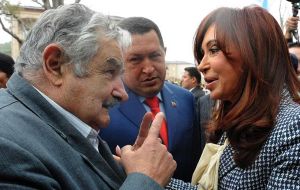MercoPress. South Atlantic News Agency
Kirchner Gets UNASUR Job; Mujica Admits “Political Cost” but Privileges Unity
 A costly step for President Mujica who supported the unity consensus
A costly step for President Mujica who supported the unity consensus Former Argentine president Nestor Kirchner was sworn Tuesday as Secretary General of the Union of South American Nations, UNASUR, following the consensus reached among the twelve country members overcoming differences of previous meetings.
Uruguay’s abstention was crucial for the consensus, since it had vetoed a previous attempt to name Néstor Kirchner, and Uruguayan President José Mujica admitted before his peers the “political cost” of such a position but he also underlined that his administration privileged Latin American unity.
“Given the strong contradictions surrounding the issue in my country, it is a costly step for this president, but we have decided to support the Latin American presidents’ consensus so we can give this step forward… our ambition is to progress and advance with the rest of the continent’s countries,” said Mujica. “Governments can’t just do what they would like to, but rather just manage what they can,” added Mujica.
Uruguay’s former president Tabaré Vázquez had vetoed the nomination in 2008 in the middle of deteriorating bilateral relations with Buenos Aires over the construction of a pulp mill on the Uruguayan side of a shared river. The issue was recently cleared with a judgement from the International Court of Justice in The Hague, supporting the “non-contaminating” pulp mill.
Mujica said that Uruguay supported the consensus decision “with no conditions or conditioning, and for the unity of Latin America. We are going to continue betting to this policy and the good faith of our peoples.”
“We have decided to give priority to South America so we can have a continental representation—without committing the sovereignty of each of its countries—and so we can tell the world that here we are, and we are struggling for shared interests and traditions,” insisted Mujica on explaining Uruguay’s position that opened the way for the consensus.
The extraordinary UNASUR Presidential Council Summit is hosted by President Cristina Fernádez, in Campana, 60 kilometres north of Buenos Aires. Attending the meeting are Mrs. Kirchner from Argentina; Brazil’s Lula da Silva; Bolivia’s Evo Morales; Ecuador’s Rafael Correa; Chile’s Santiago Piñera; Paraguay’s Fernando Lugo; Uruguay’s Jose Mujica; Venezuela’s Hugo Chavez plus foreign affairs ministers from Colombia, Peru, Guyana and Surinam.
Mrs. Kirchner, “for obvious reasons”, abstained from voting. Brazil’s Lula da Silva praised the nomination, “Kirchner has experience, knows the continent and is well aware of the differences and difficulties we face; he’s a hundred per cent apt to become an extraordinary Secretary General.”
Venezuela’s Hugo Chavez “feverously” supported Mr. Kirchner and Paraguay’s Fernando Lugo also praised the new secretary general but warned he has a difficult task ahead. Chile’s Sebastián Piñera did not spare words but called on the block to establish “demanding” objectives and a timetable to take advantage of the “region’s potential”.
Following the swearing in ceremony, UNASUR begun debating behind closed doors a long agenda of issues which includes aid to earthquake ravaged Haiti and Chile; defence agreements with out of the region countries, the Honduran situation; the South Development Bank and the formal ratification of the UNASUR documents by the different parliaments. So far, only four countries have completed the procedure, Ecuador, Bolivia, Surinam and Venezuela. Four more ratifications are needed for the treaty to effectively and legitimately begin to operate.
Under the terms of the UNASUR documents, the Secretary General is elected for a two year period, renewable for another two years, and during that period, “the Secretary General and his staff will have exclusive dedication, will not request or receive instructions from any government or entity which is not UNASUR and will abstain from actions incompatible with their condition of international officials, responsible only before the international organization to which they belong and represent”.
In practical terms, this means Mr. Néstor Kirchner must abandon his bench at the Argentine Lower House or simply resign to the post.




Top Comments
Disclaimer & comment rulesCommenting for this story is now closed.
If you have a Facebook account, become a fan and comment on our Facebook Page!